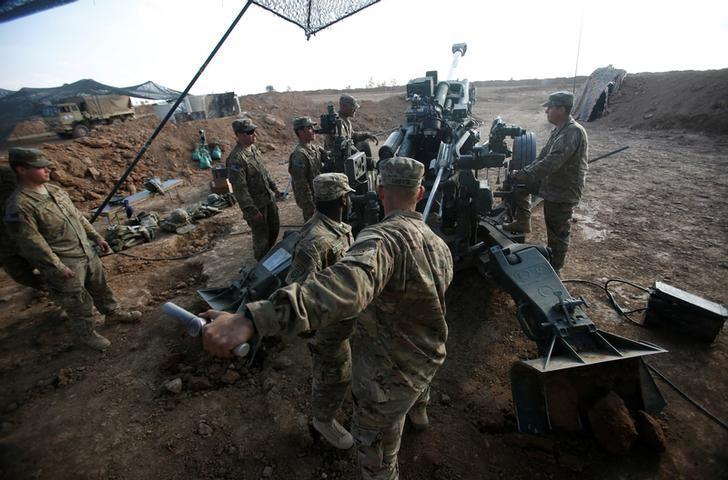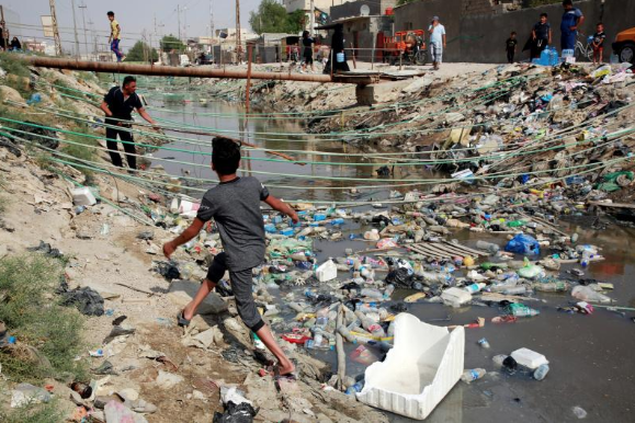U.S. troops are on their way out of Syria. In Afghanistan, a similar drawdown, perhaps even a permanent exit, is in the offing as peace talks with the Taliban continue. On February 2, U.S. President Donald Trump turned his attention to a third crucible of conflict in the region: Iraq.
This time, however, rather than talk of a drawdown, Trump argued in an interview with CBS’ Face the Nation that U.S. troops should remain in Iraq—not just to continue to fight the Islamic State, or ISIS, but to “watch Iran.” U.S. bases in Iraq, Trump suggested, would serve as outposts for monitoring Tehran’s activities relating to “nuclear weapons or other things.”
Trump’s comments are reckless. They reflect a misguided obsession with Iran and portray Iraq as little more than a pawn in the United States’ Iran policy. Such rhetoric is poison for Washington’s relationship with Baghdad—one of the last remaining anchors for U.S. influence in a region littered with dysfunctional and counterproductive partnerships.
The United States’ invasion of Iraq in 2003 and the disastrous occupation that followed opened the door to Islamist militancy and sectarianism in the heart of the Arab world, while helping Iran to expand its power. The region—and the world—continues to suffer the consequences. Yet despite this tortured history, Iraq’s leadership remains remarkably open to U.S. diplomatic and security assistance.
One of us recently visited Baghdad and spoke to political leaders from across the political spectrum, including critics of U.S. policy in Iraq. Many of these leaders expressed the hope that Washington would continue to support the Iraqi government in its efforts to improve security and build state institutions. U.S. signals intelligence, above all, is invaluable to the Iraqis; no other source can provide the satellite imagery and overwatch to monitor potential new ISIS beachheads. With American help in counterterrorism and intelligence collection, Iraqi leaders surmise, the Iraqi government can defeat insurgents and grow strong enough eventually to fend off outside meddling—both from the United States and from Iraq’s eastern neighbor, Iran.
Ever since the U.S. drawdown in 2011, Baghdad has had to perform a careful balancing act, maintaining friendly ties with both Washington and Tehran and using each to stave off dependency on the other. “We don’t like the American military presence in Iraq,” a senior politician told us in January. “But if they leave suddenly, Iran will fill the vacuum.” Behind closed doors, much of Iraq’s political class agrees: until recently, even members of the Sadrist movement, a group known for its fiery nationalist rhetoric and armed resistance to the U.S. occupation, tied calls for U.S. withdrawal to an insistence on the exit of all foreign (read: Iranian) forces from the country.
But the Sadrists and others can only sustain this pragmatic position in public if the United States avoids creating the impression that Iraq is part of a U.S.-led anti-Iran, pro-Israel axis. Even sympathetic Iraqis perceive only limited shared interests with the United States. And Iraq needs the help it gets from Iran, which has made major investments in the country’s industrial and tourism infrastructure and is Baghdad’s most important trade partner for food and natural gas. Tehran also played a crucial role in the war against ISIS and provides technical assistance to the Iraqi interior ministry and parts of the intelligence apparatus. Iraqi elites, as a result, are loath to alienate Iran.
Put simply, military and intelligence partnerships require discretion and bedrock respect for the sovereignty of partners. Iraq is willing to host a wide variety of U.S. military assets and even turn a blind eye to U.S. surveillance activities that are not related to the fight against ISIS. But Iraqi leaders will have a much harder time doing these things if the United States insists on calling attention to its assets and publicly portrays Iraq as a base from which to monitor Iran and protect Israel, as Trump suggested.
A NEW MIDDLE EASTERN ORDER
Trump’s blunder is all the more lamentable because Iraq’s continued openness to productive security and intelligence cooperation sets it apart from virtually every other U.S. partner in the Middle East, including Egypt and Saudi Arabia. This makes Iraq a weak but vital ally and bulwark against Iranian influence.
The country’s intelligence apparatus provides a case in point. Multiple competing agencies collect intelligence and engage in counterterrorism operations. The United States trusts some of these agencies and provides them with valuable intelligence; Iran trusts others. But in his interview with CBS, Trump seemed to advocate scaling back U.S. involvement, arguing that the United States could always “come back if we have to.” This is a mistake. Long-term partnerships and the expensive infrastructure that undergirds them cannot be rebuilt overnight.
Intelligence cooperation declined once before, after the 2011 U.S. troop drawdown. When ISIS fighters began spilling over from Syria soon afterward, Iraq was left unprepared. Having experienced this cycle of separation, subsequent trauma, and renewed cooperation, Iraq and the United States now have a much clearer sense of what is at stake in the partnership. Iraqi leaders must heed this lesson, too, even if domestic political pressures make it tempting for them to push an anti-American line.
Iraq is where the regional order was destroyed in 2003, and it is the logical starting place for redressing the aftershocks. Helping to rebalance the region through diplomacy would be a much better use of U.S. power than putting pressure on Iraqi partners and turning the country into a battleground for the U.S.-Iranian rivalry. That rebalancing will necessarily entail stabilizing Iraq’s domestic politics and security situation. But it will also involve reestablishing ties to Arab neighbors—ties that withered after Saddam Hussein’s fateful decision to invade Kuwait in August 1990.
Iraq’s future is of strategic interest to all of the Middle East’s major players, not least because the country sits at the fulcrum of several important relationships: between the United States and Iran, between Iran and the Arab world, and among the Arab countries. The Gulf Arab states, led by Saudi Arabia, have recently adopted a pragmatic approach to Iraq. Saudi Arabia reestablished diplomatic ties, reopened border crossings, and took the initiative for future economic and security cooperation. These promising steps are long overdue. Yet they still fall short of a comprehensive framework, an ambitious task to which the United States should apply its weight.
“BY SUMMERTIME, IT’S GAME OVER”
The Iraqi state must contend not only with an often volatile security situation but with endemic corruption and chronic difficulty in providing basic services to its people. The crisis over potable drinking water in sections of Basra led to demonstrations that turned deadly just last fall. Prime Minister Adel Abdul-Mahdi, in office since October 2018, has effectively staked his political future on the provision of basic services, even prioritizing this goal over achieving political unity in his cabinet (or even filling key positions). “We have one year to get this right, maybe less,” one adviser to the prime minister told us. “If we can’t deliver enough electricity by summertime, it’s game over.”
Baghdad is exploring contracts for U.S. energy companies in the Iraqi oil sector, and international technical advisers and U.S. companies are already helping Iraq find a way to fuel its electricity plants using the country’s previously untapped natural gas reserves. The new government is also receptive to U.S. help on such governance issues as organizing the ministry of defense and streamlining the paperwork that citizens have to complete.
Washington has made its help easy to accept by offering it at a relatively low political cost. Iraq could not have defeated ISIS without U.S. assistance, for example, but the United States did not call in its debt by seeking excessive influence over Iraqi politics afterward. Iran, by contrast, has long tried to increase the power of pro-Iran militias in Iraq’s political system.
As the United States begins pulling out of Syria and, potentially, Afghanistan—a necessary, if poorly executed corrective to U.S. overextension—Iraq is a test case for the value of continued engagement. At a moment of critical reflection on U.S. commitments in the Middle East, Iraq offers an opportunity to build diplomatic, security, and intelligence ties that defy recent trends and deliver benefits to both sides.
But success ultimately depends on the discretion and judgment of an administration that has often been lacking in both, and which continues to view Iraq as ancillary to its main regional objectives. Even as Iraq struggles with major energy shortages, the Trump administration is urging it to stop buying energy from Iran. No amount of diplomacy can overcome that level of myopia. If the United States does not reframe its approach to Iraq, it will succeed in undermining one of the few remaining avenues for constructive engagement in the region.
Source




 RSS Feed
RSS Feed